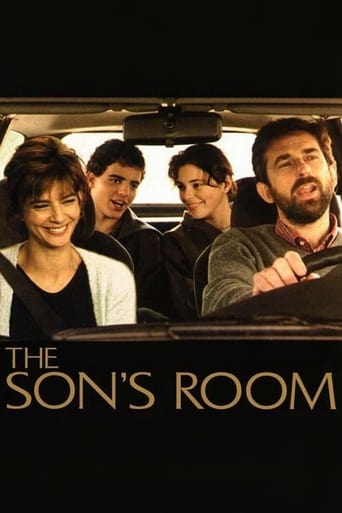Vonia
The Son's Room (Italian: La stanza del figlio) (2001)
Director: Nanni Moretti
Watched: 4/2018
5/10 Simple without flair,
Bad therapist portrayal,
Honest but timid with risks,
Still good classroom viewing for
Five stages of grief tour. Tanka, literally "short poem", is a form of poetry consisting of five lines, unrhymed, with the 5-7-5-7-7 syllable format.
#Tanka #PoemReview
G K
A close-knit family unit begins to unravel when the teenage son dies in an accident.The Son's Room is a subtle, gentle study of bereavement, sharp on the distinction between public and private grief, that mixes director Nanni Moretti's usual wry humour with a new-found profundity: the results are both funny and sad, but always lively and inquisitive. Its ending is all the more moving for being discreet and understated. The film was the winner of the Palme d'Or at the 2001 Cannes Film Festival. It also appears in Empire's 2008 list of the 500 greatest movies of all time at number 480.
maipiusoli
Nanni is far better then Kieslowski. Kieslowski did not shoot Ecce Bombo. He did not shoot Bianca. He did not shoot Sogni d'oro. He did not suck Laura Morante's breast. Anyway. Nanni you can't. You can't do this to me. This is not you. This is some kind of sugary thing. You made me laugh and think. And now: this. What is it? I don't know. I thought you were trying to look like Bergman. But he was good. You aren't. I mean: no, you are. But. But this is not you. You can't be good trying to look like Bergman. What have you done? You are not young anymore. You are not the son anymore.P.s.: Stefano Accorsi. I can't believe it. I simply can't. Stefano Accorsi. Again: I can't.
buonanotte
The choice of such a difficult subject is yet a good reason for awarding this film. That's why I perfectly agree with the juries. I also noticed that a good film never lets you down and "The son's room" is one of those cases. Despite few slow scenes (With three or more characters, some dialogues sound forced) the plot has got not less than three "re-births" in it (Syd Field would call them "coups the theatre"). The first half an hour rolls well. Moretti introduces the characters and set them in a mid-sized Italian city; he paints the portrait of a mid-class family particularly keen to culture and good principles. He also pushes on two of the main educational devices: school and sport. I think that the whole arrangement is what allows Moretti to develop this sad and thoughtful story. After the death of one of his sons, the protagonist (A respectable psychologist) faces a personal crisis. Also the rest of the family (wife and one daughter) get through a tough experience. I think that the key-point of the film starts exactly here: while the family tries to re-gain its balance, the viewer is meant to understand (as much as it is possible) what this family used to be. After weeks of mourning and lack of trust, a warm sense of self-consciousness and stability gets the story to an end.



